Jeff and Tracy Waters, Staines
"It just felt surreal, totally like a dream, when it first happened," says Jeff. "You think, is it real?"
As the flood water rose up their garden early this year, Jeff and his wife Tracy watched in disbelief. As a precaution, they moved their car to higher ground. "Even then you're thinking, is it worth it?" Jeff says. When the Environment Agency told them it was going to get worse, they took their belongings upstairs. "That was the time we were a little bit scared. It kept going up and up and up."
Eventually the fire brigade was pumping out the water and the pair were helping evacuate a neighbour by boat. "It's always been a close community," Jeff says. "We have annual barbecues and get-togethers. But it probably has made us closer." Every day until the water subsided, they waved at their neighbours through their upstairs window.
"I wouldn't be surprised if it was linked to global warming somehow," Jeff says. "But everyone's blaming it on the Thames silting up, on it not being dredged, on the drains. Years ago I remember seeing a big council lorry come round, put a big pipe down the drain and suck all the muck out. You don't see that any more."
Now that summer is here and the buildings are dry, the flood seems almost unimaginable. "You wouldn't believe it's the same place," Jeff says. "You'd think nothing ever happened."
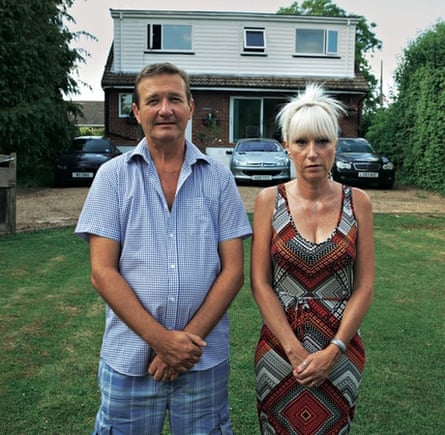
Tricia and Julie Barnes, Old Windsor
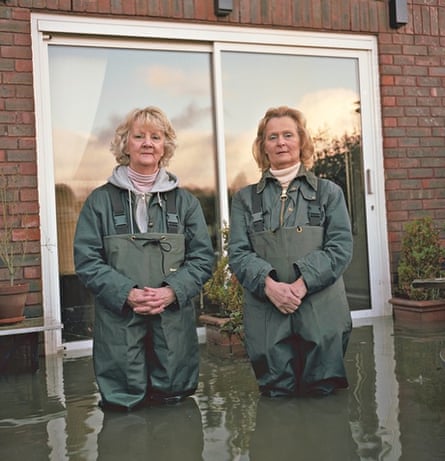
"I've got it in red pen in my diary here," says Tricia Barnes, 67, a boutique worker who lives in Old Windsor with her younger sister, Julie. "It comes over the patio on the fifth of January. And then it comes up through the drains and through the garage, and meets there. On 6 January it comes into the house. It just kept coming and coming. It came into the hall the next day and got deeper and deeper, until on the 10th we evacuated to my godmother's in Dorney. The dog had to swim out. And that was just the first flood."
Tricia and Julie have lived here, right on the river, for 26 years. It was a newly built town house when they bought it, standing beside five others down a long shared driveway. "We were the first people to live here, and the river and the view were part of the charm."
They recall a huge flood in 2003, and a couple of inches of water in 2012, but this year two floods in quick succession brought 28 inches of water to their downstairs room. Between them they lugged precious possessions upstairs and placed furniture on stacks of bricks. "You're really on your tod, you're marooned," Tricia says. "You can't get friends calling round to help unless they've got chest-high waders.
"But it's the aftermath as well," she adds. "It's what it leaves behind. You get so much mud – four or five inches. And shovelling mud is not an easy job. But we didn't cry, did we, Julie? We're quite stoic like that."
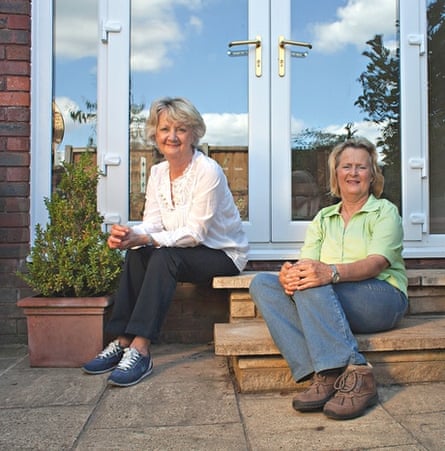
Richard Large, Moorland, Somerset
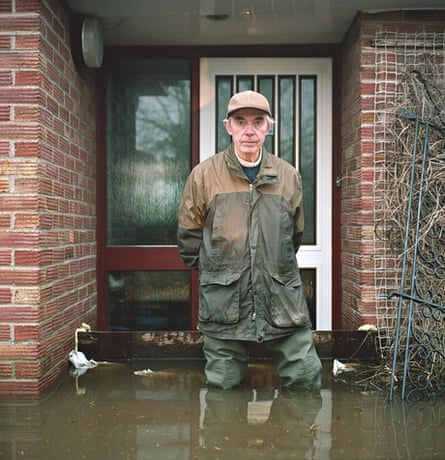
Richard Large and his wife had decamped to their son's house in Reading by the time the floods reached Moorland. But Richard, 67, a gunsmith and CCTV engineer, was able to watch the progress of the water via the closed-circuit cameras installed around the house.
He followed it as it rose up his driveway and on towards his front door. "And I kept on watching, pretty much 24 hours a day, until the freezer in the garage succumbed to the water – that put the mains off and I lost communication," he recalls. "I felt completely helpless. I was in a dreadful state, I was having trouble speaking."
Like many locals, Richard believes that the village was flooded to protect the town of Bridgwater, and that there wasn't enough dredging. "At the last minute they opened the reservoir, because they thought it was going to breach. They opened the sluice gates and emptied the whole lot on top of us." And then, he says, there was 40 cubic metres of water a second pouring on to this land. "I don't know if you can picture that?" We are sitting on his patio and he waves his arm out towards the wide lawn and the trees beyond. "Take an area the size of this garden, a metre deep, every second.
"I miss the garden," he says. "I miss being able to walk along the riverbank. And my wife feeling safe." The ordeal and upheaval has affected her badly. "She's disabled. She's in hospital at the moment. It's really knocked her back. The whole lot together's just been too much for her." And it has, he admits, knocked him back, too. "I thought I was fireproof, nothing could get to me," he says. "Because I'd always made plans for what I would do. But this time, I couldn't do anything."
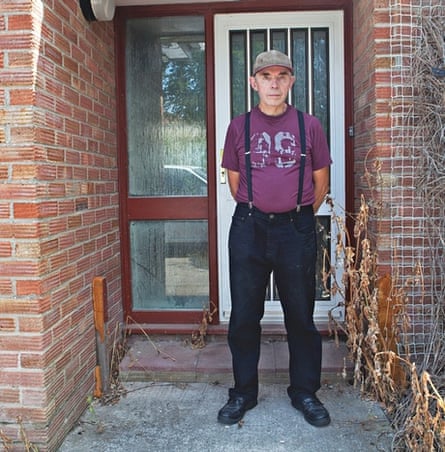
Dave Donaldson, Moorland, Somerset
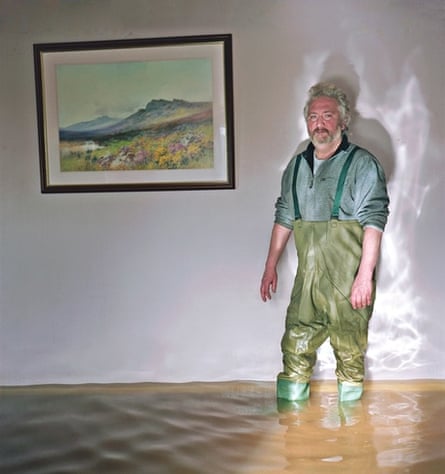
By the time the police helicopter hovered over their house urging them to evacuate, it was already too late. Dave and Sue Donaldson, their daughter Heather, 12, and son Luke, 18, who is severely disabled, were unable to leave their property not far from Moorland. It was the emergency services who finally helped Sue and the children get out, relocating them to a bungalow not far away.
Dave stayed on. For a week he lived in the house, then moved to the large shed in the garden. "I stayed for the animals," he explains. Local farmers took in the ponies, the goat, the sheep and chickens. "But the pigs were too hard to move. Then there's the dogs. And I've got three cats."
It has made for a strange few months. Outside, a trail of devastation: duckweed, detritus, 85mph winds, police, roadblocks. "It looked like something out of a weird sci-fi movie," Dave says. Inside, the shed acquiring the air of solitary male existence: a TV, dartboard, sofa; a Confederate flag and a poster of Clint Eastwood as Dirty Harry. His two dogs sprawl on the sofa; a chicken bobs in to say hello. "In some ways it's been quite nice-ish. But obviously when you've got family, you want to be back together."
Sue and the children will return next week. The house renovations are now well under way, project-managed by Dave. "It's been pretty straightforward, really. Part of it's been rewired, and the walls were stripped off three foot and rerendered and plastered." Today in the hallway that once ran two feet deep with water, decorators are painting the walls a shade of pale blue. "You don't need an awful lot of water to ruin a house," Dave says.
The other improvement has been the new sense of community. "We used to ignore each other. We were like passing ships, a lot of us. But of course it's brought us all together."
One night, after the water had subsided, they held a disco at the village hall with an underwater theme. Dave, a former sculptor, made a booth for the DJ in the shape of a submarine. "We had a machine pumping smoke through the portholes." He smiles. "Everyone got wrecked. There's photos of people dancing on it later in the night."
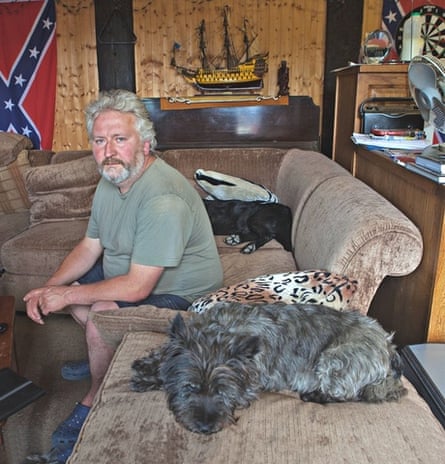
Shirley Armitage, Moorland, Somerset
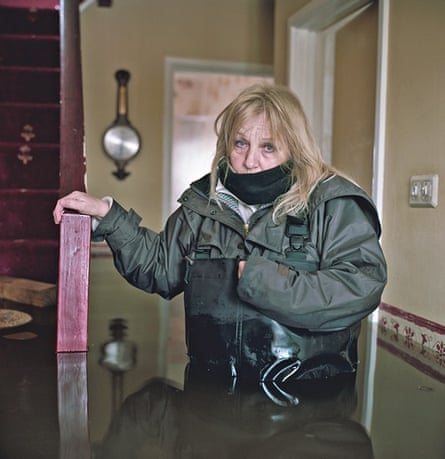
Shirley's father Walter built this house in 1955. "Me and my brother-in-law," Walter recalls. "He did the building, I did the labouring. Every brick I handled."
The house is set on the flat plains of the Somerset Levels and the banks of the river Parrett. Look out through the window of the utility room and you will see the broad fields that belonged to Walter's father, a farmer.
The floods this year were the worst they'd seen. Shirley – chest-deep in water, her father evacuated – was devastated by the damage to her home and distraught at the decades of family photographs floating around her living room.
Since then, life has been reduced to a temporary home in Bridgwater and a caravan in the front garden, from which Shirley oversees the renovations. The walls she once decorated have now been stripped and replastered, and the rooms buzz with electricians, here to rewire the entire house. But you can still smell the damp in the air, still see the white line of the watermark that runs across the front door.
It is Shirley who has muddled through the insurance claims and fought for the work to begin on their home, and now she is exhausted. "Six months this has been going on," she says. "There is no time any more – time doesn't mean anything. Every day you're just rolling along. You're fighting all the time, there's paperwork all the time, and you get confused. You start to wonder, what's this form for?"
She has been most upset about the loss of her hobby farm up the road. Though she could not reach it during the floods, she knew the damage would be bad. "I could see it," she says, "across the water."
She is unsure whether she will ever be able to rebuild it: her calves and her chickens have been safely rehomed, but the ruined stables will not be covered by her insurance. "I can't get any help. I don't fall into any category at all." She looks bereft. "It was a beautiful little paradise," she says
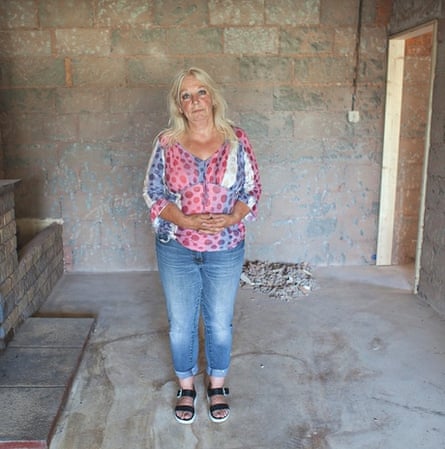
Amante Witherick, Moorland, Somerset
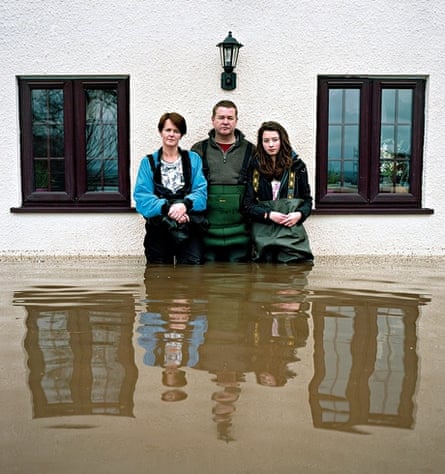
"I left at three o'clock to collect the children," remembers Amante Witherick, 43, who runs a balloons and chair-cover company. "No water was in the house then. But my partner Stuart rang me at quarter to four and said three rooms were completely flooded. Forty-five minutes, and we were two inches under water."
A short while later, Amante called her partner again. "And he said, 'I'm terribly sorry but I've had to take a sledgehammer to one of the floors.' He could feel the pressure building and the floor shaking, and so he hammered a hole in the hallway, and a big fountain of water came up."
Amante, a former diver, speaks about water with a certain reverence; she talks of watching the floods coming across the fields, of blocking the drains and wondering, where is the water going to go? It will happen again, she believes. "It's global warming, it's what we're doing to our environment. You can't stop the rain.
"I take water hugely seriously," she says. "I've been in lots of situations where I've had to rescue people, and I've had very dear friends die in diving accidents." Once she spent two days at sea on a life raft without food when the boat she was living on blew up. "When you've been through something like that, honestly this is nothing. We saved our kids and our cat. That's the important bit – not your stuff."
Still, after eight years in a house they renovated themselves, there are some things that cannot easily be replaced: the kitchen they loved, the summerhouse, and all of the memories that can gather at certain points in a home.
"I remember being pregnant and painting the pillar in the hallway, and how I had paint all over my belly," Amante says. "And that will be gone now – the pillar has to be replaced and repainted. I'll never look at it again and laugh about those little memories." She brightens. "But it's not the important stuff."
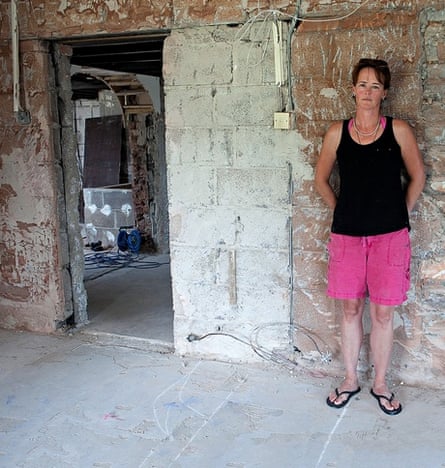
Neil Craddock, Burrow Bridge, Somerset
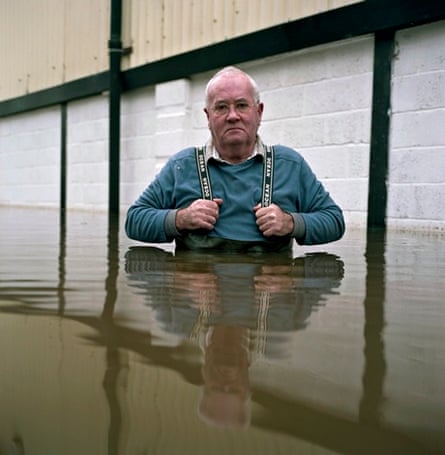
"It was opening the main gates of the building to see this tangled mass of timber, machinery and debris floating," says Neil Craddock, 65, describing the lowest point in his engineered wood flooring company being flooded. "To stare into that, you can't actually think that you could ever sort it out. But you can. Everything's doable. You've just got to be determined."
Craddock, a trained engineer who moved into wood flooring two decades ago, built his factory here 11 years ago. Flooded in 2012, the building could not be insured. "So all of the damage I've had to pay for out of our funds," he says. They lost machinery, equipment and timber stock, as well as sustaining damage to the building itself. And, for the 20 weeks that the factory was out of operation he had the cost of keeping his six members of staff in employment. "I don't want to put a figure on it," he says. "But it was an awful lot of money."
Today he walks around the factory, showing the mark on the wall where the water reached – around 8ft high, and recalling the extent of the damage. "You could've cried," he says. "That's when you have to dig deep. But you find there's a resistance within you. We all just got stuck in and started physically pulling timber out of the building. There's no point just looking at it."
While other local firms have buckled under the damage wrought by the floods, Craddock insists he and his staff were determined to get back to work, and now business is thriving.
"There was never any question that we would give up," he says. "And I think ultimately now we are back in business it's a better place – people are more positive. We've survived, we've come out the other end and rebuilt ourselves."
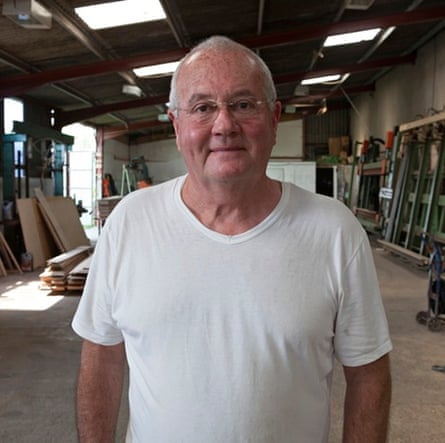
Peter and Marion Hilling, Burrow Bridge, Somerset
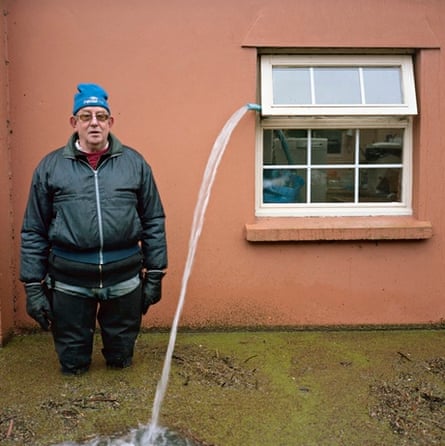
Over the course of a couple of weeks the flood water gradually reduced Marion Hilling's life to a small island. "You could see every day it was coming nearer," says the retired teaching assistant, 64. "I had marker sticks in the lawn and every day I was moving them nearer and nearer the house."
She moved her car to higher ground, dragged her furniture upstairs, took two of her three cats to a cattery, and settled down to life in her kitchen."Because the rest of the house was so empty," she explains, "because all the furniture was gone."
When the septic tank went under water, she was left with no plumbing. "So I was washing down in a bowl of water and then throwing it across the lawn. I was doing that for several weeks. I'm sure was in a really bad mental state – I kept bursting into tears. And I lost an awful lot of weight, because when you feel like that you're so stressed that your throat constricts and you can't eat. When I next had my hair cut my hairdresser said I'd actually got a bald patch. She said that's stress."
On the morning of 5 February the water had reached 3ft from the front door, and Hilling could see it ebbing into the yard at the side of the house. "That morning," she remembers, "I sat on the top of the stairs and thought, I'm going to have to go soon, this is not good."
A friend appeared on her doorstep and tried to convince her to leave. "And I said, 'Oh no, I'm sure the water will go down, it won't get as far as the house.' But I think she alerted the police in the village and they came and got me. She came as well, which was really lovely, and I cried on her shoulder. They took me off in a 4x4 with a cat basket and took me round to a holiday let."
For many years, Marion, her husband Peter and their two sons lived in Hong Kong (where Peter was working when the floods hit). "We lived 12 floors up in a tower block," she recalls. "So when we moved here 18 years ago, this was like paradise; in all the years of high-rise living I just wanted to be somewhere I could grow vegetables."
It is a handsome house, built in 1897, with five bedrooms, outbuildings and four acres of land. The garden itself covers about an acre and is where Hilling likes to spend the bulk of her time. "I grow runner beans, spinach, sea kale, beetroot, peas, broad beans, asparagus," she says. But the flood took around a third of her plants. "Big established shrubs," she says. "Plants as tall as this room. Eighteen-year-old lilac bushes."
But the floods have changed how she feels about this paradise, and if she could she would up sticks and move far away. "Yes. Oh yes. But my husband wouldn't," she says, looking small and weary in her kitchen chair. "I don't feel so sentimentally attached to it now. It's just a house."
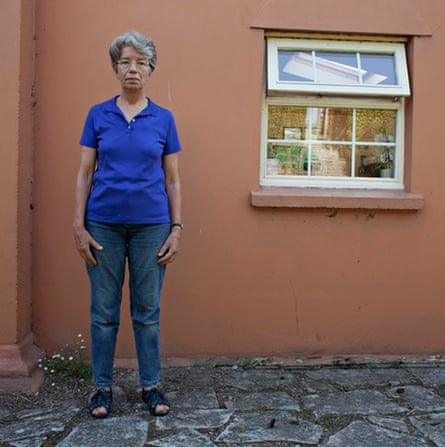
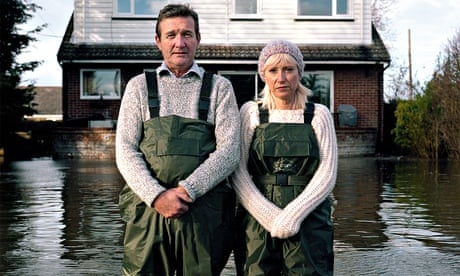
Comments (…)
Sign in or create your Guardian account to join the discussion